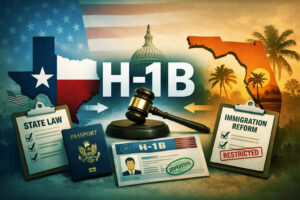The recent appointment of Joseph Edlow as the new Director of U.S. Citizenship and Immigration Services (USCIS) has sparked discussions across the immigration and tech sectors, especially regarding the future of the H-1B visa program. Known for his conservative stance on immigration enforcement, Edlow has already signaled a significant shift in how the agency will manage and enforce the H-1B program.
More H-1B Oversight and No Lottery
Edlow has made it clear that he intends to tighten scrutiny around H-1B, a program that enables U.S. employers to hire foreign workers in specialized fields such as technology, finance, and healthcare. His priorities include the standard refrain of reducing fraud and abuse, increasing site visits, and issuing more Requests for Evidence (RFEs). However, Ludlow also envisions a much more fundamental change to the program.
One of Edlow’s most consequential proposals involves replacing the current random lottery system used for selecting H-1B applicants with a wage-based model. Under this plan, applicants with higher-paying job offers would be prioritized over those with lower salaries. While this change has the stated goal of ensuring that H-1B visas go to highly skilled, fairly compensated individuals, it could severely disadvantage entry-level applicants, recent graduates, and smaller companies unable to offer top-tier salaries.
Impacts on the Future of the H-1B Program
The proposed reforms could reshape the H-1B program in several ways. First, by favoring high-wage roles, the program would likely benefit large tech firms and multinational corporations capable of offering substantial salaries. Conversely, startups and smaller companies that often rely on skilled but lower-paid foreign workers could struggle to remain competitive in securing H-1B talent.
Second, increased scrutiny and compliance requirements may introduce delays and uncertainty in the application process. This could deter employers from hiring foreign workers altogether, especially in roles where time-sensitive projects are involved.
While these measures may strengthen the integrity of the program, they could also narrow the pool of eligible candidates and discourage highly skilled workers from pursuing employment opportunities in the U.S. through the H-1B route.
EB-5: A Viable Alternative for Some
Given the shifting landscape under Edlow’s leadership, some foreign nationals may consider the EB-5 Investor Visa program as an alternative path to U.S. residency. Unlike H-1B, which is employer-sponsored and temporary, the EB-5 program offers a direct path to a green card in exchange for a qualifying investment.
If proposed H-1B changes take effect, EB-5 may become the most viable path for those looking to transition between college and the workforce. Entry level positions typically filled by college graduates may not provide the high wages needed to get priority in the proposed system. Additionally, individuals who would prefer to work at startups or smaller companies may also need to look at EB-5. Moreover, families worried about children aging out of dependent status under H-1B could also benefit from the more stable EB-5 program.
As USCIS moves toward a more restrictive interpretation of the H-1B program, individuals and employers alike should reassess their strategy for remining in the United States. Those with the means to consider investment-based immigration will want to exploring EB-5 as a potential solution. The above article is intended for informational purposes only. Anyone with specific issues relating to H-1B or EB-5 should consult with an experienced immigration attorney.



